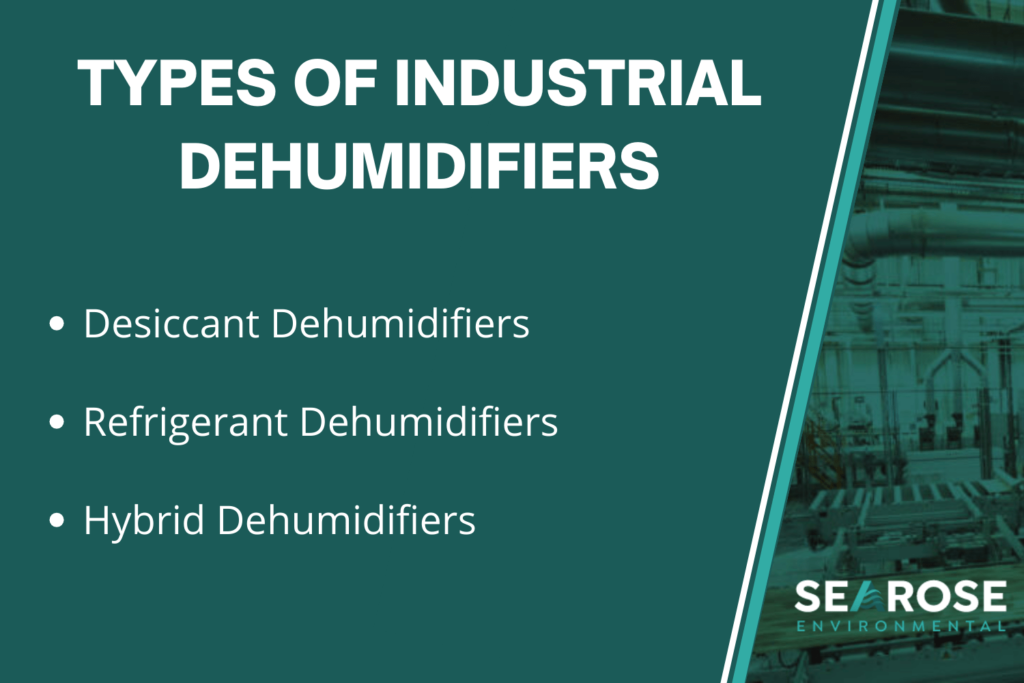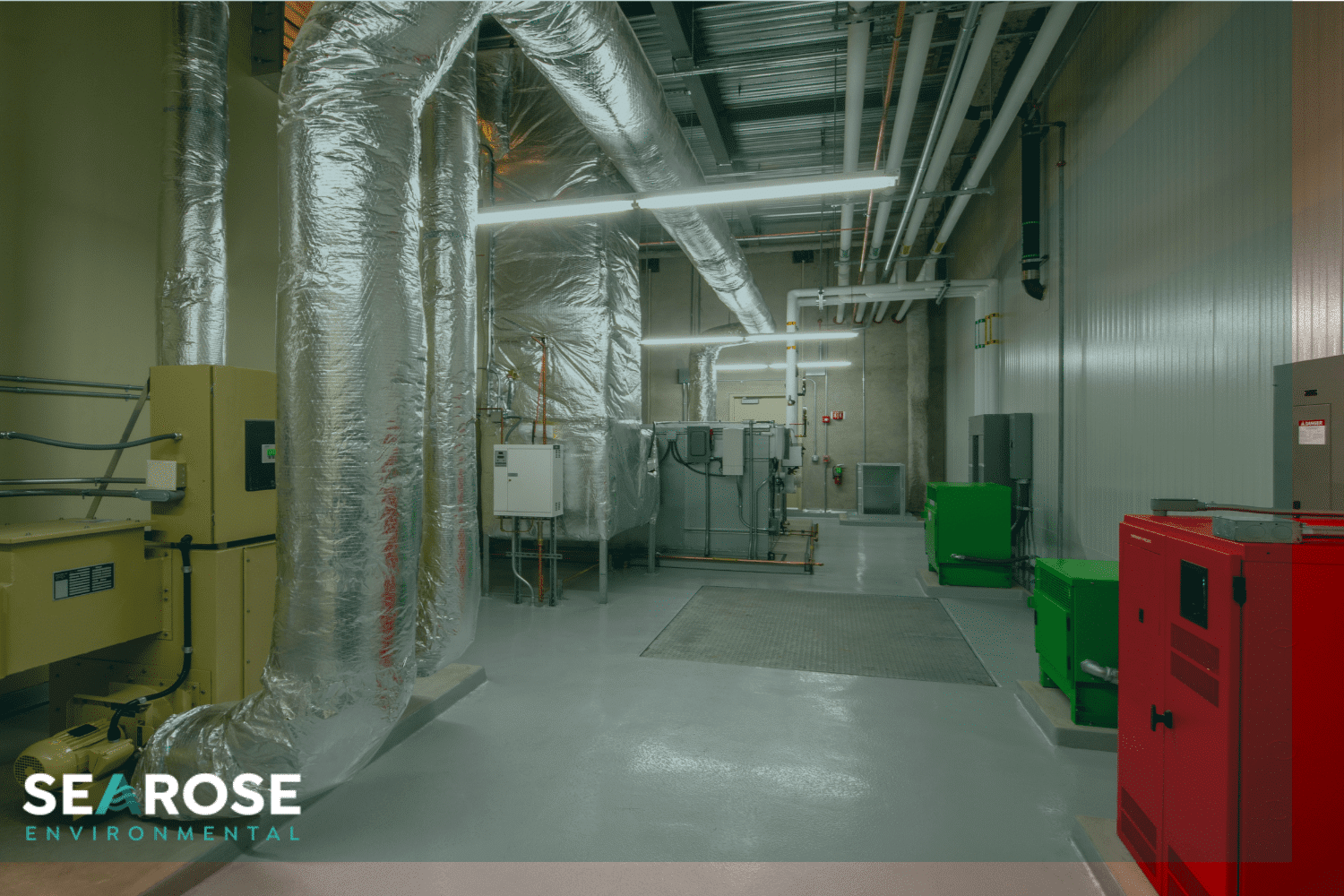When it comes to industrial dehumidifiers, we typically split them into two distinct categories; refrigerated and desiccant.
However, as technology advances and the use case for industrial dehumidifier technology continues to expand, hybrid industrial dehumidifiers have now entered what was once a two-horse race.
In this article, we’ll take a look at the different types of industrial dehumidifiers, their function, industry use case, and provide guidance on determining the right industrial dehumidifier based on your unique application.
Table of contents
- What are industrial dehumidifiers?
- Function of industrial dehumidifiers
- Industry use case for industrial dehumidifiers
- Food & beverage
- Electronics
- Medical
- Warehousing
- Museums & galleries
- Different types of industrial dehumidifiers
- Desiccant dehumidifiers
- Refrigerant dehumidifiers
- Hybrid dehumidifiers
What are Industrial Dehumidifiers?
Industrial dehumidifiers are a vital piece of equipment across a range of industries that rely on stable humidity to maintain the integrity of perishable goods.
Climate control is an obvious consideration when it comes to food, medical, and warehousing; however, it’s also essential to consider further environmental factors—including humidity—to maintain the integrity of food, beverages, and other goods that can be subject to degradation under different environmental stresses.
Maintaining optimal humidity levels is essential for preserving the integrity and longevity of food, beverages, and other goods. Industrial dehumidifiers can provide a reliable and efficient way to control humidity in indoor environments.

Function of Industrial Dehumidifiers
Industrial dehumidifiers help to create a stable humidity level that efficiently manages humidity, mould, and mildew across a range of commercial and industrial spaces and applications. In spaces where ventilation, air temperature, and moisture can be challenging to maintain, an industrial dehumidifier works to remove excess moisture from the air and create a more controlled and predictable environment. Crucially, industrial dehumidifiers work to do the following:
Protect goods from damage. Moisture can wreak havoc in large spaces to cause mildew, mould, and rust that can lead to direct product damage, as well as indirect damage and premature wear on equipment. Critically, for food and beverages which are subject to use-by and best-before dates, industrial dehumidifiers ensure consistency in this guidance from manufacturers.
Ensure the quality of products. Products such as medicines and other consumables outside of regular food and beverage items, are highly sensitive to humidity. Under the wrong conditions, industrial environments with large fluctuations to humidity levels can cause quality issues which are almost impossible to effectively monitor.
Improve worker safety & comfort. Equipment and goods are one thing, the comfort and safety of workers is another altogether. Aside from the obvious benefits of a stable and predictable working environment, industrial dehumidifiers also help to ensure nasties such as mould and mildew do not compromise air quality.
Prevent costly damage to equipment & infrastructure. Environments that are subject to spikes and dips in humidity are more prone to equipment and infrastructure wear and tear, which can lead to breakdowns and repairs.
Industry Use Case for Industrial Dehumidifiers
Industrial dehumidifiers can be used across a range of different industries and business types to control humidity and ensure optimal conditions for product storage, processing, and preservation. Some of the (many) industries that make use of industrial dehumidifiers for this purpose include:
- 3PL, freight & logistics facilities
- Agriculture
- Construction
- Data centres
- Electronics manufacturing
- Food and beverage processing
- Gyms and sports centres
- Museums and art galleries
- Pharmaceutical manufacturing & storage facilities
- Printing and packaging facilities
- Swimming pools and spas
- Textile manufacturing
- Warehousing and storage
- Woodworking

Different Types of Industrial Dehumidifiers
The two main types of industrial dehumidifiers are desiccant and refrigerant. Desiccant dehumidifiers are ideal for applications where low humidity levels are required, while refrigerant dehumidifiers are more energy-efficient and easier to maintain. Hybrid dehumidifiers, on the other hand, combine the advantages of both desiccant and refrigerant technologies, making them a good choice for diverse applications or facilities that fulfil different functions.
Desiccant Dehumidifiers
Desiccant dehumidifiers use a desiccant material such as a silica gel that absorbs or sucks moisture out of the air. Once the desiccant material removes the humidity from the air, it is the regenerated by heating it which drives off the moisture to effectively remove the moisture from the air – even at lower temperatures.
Desiccant dehumidifiers are widely used in environments where very low humidity levels are required such as food processing, medical processing, pharmaceutical manufacturing, and storage.
Refrigerant Dehumidifiers
Refrigerant dehumidifiers use refrigeration technology to effectively remove moisture from the air and neutralise humidity through cool air cycles. The cooled air is reheated and then released back into the room. Refrigerant dehumidifiers are commonly used in commercial buildings, gyms, and warehouses as they are more energy efficient and therefore cheaper to run.
Hybrid Dehumidifiers
As you might expect, hybrid dehumidifiers combine the functionality of desiccant and refrigerant technology to provide varied performance based on the industrial environment. For facilities that serve multiple purposes concurrently or at different types, hybrid dehumidifiers offer dual functionality through a single unity. Whilst the upfront expenses associated with buying a hybrid dehumidifier are typically higher, it goes some way to offset the ongoing cost of running an industrial dehumidifier by negating the requirement for two systems.
Final Thoughts
Industrial dehumidifiers are an essential piece of tech across a range of different commercial and industrial applications. Ensuring the longevity of sensitive goods, as well as the comfort of staff in industrial settings, industrial dehumidifiers can effectively improve the shelf life of food, beverages, and other sensitive items to ensure consistency.
